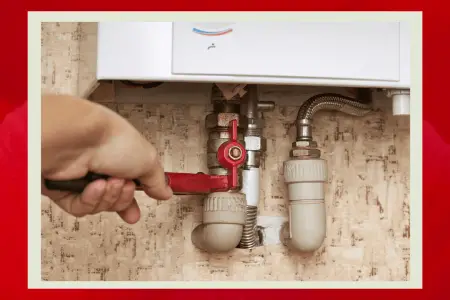Combi (or combination) boilers combine space and water heating in a single appliance, increasing efficiency and saving space in your home. They have become increasingly popular over the years, in large part due to the month to month savings in energy bills.
While combi boilers are Energy Star certified efficient and easy to install, they are not right for everyone.
Read on to learn about more benefits of combi boilers, some of its drawbacks, and whether it is right for you and your family. So let’s get right to it!
What is a Combi Boiler?
Combination (Combi) boilers provide space heating and hot water in a relatively small device. This makes them different from traditional boilers, which are designed with a focus on space heating.
Combi (or combination) boilers combine a central heating boiler with a high efficiency heating system. They heat the water directly, which means they don’t require a cold water storage tank or a hot water cylinder. You can thus install them in smaller spaces.
During the summer months, the combi boiler remains dormant for long periods, only to operate when you need hot water.
During the winter and cold season, it provides hot water on demand by storing a limited amount on standby. This lets it make up for the time it will take to heat the water in the main water line.
How Combi Boilers Work
Combi boilers work by heating water in the main water line. When you turn on the hot water tap, water from the main water line enters the boiler’s heater and activates its flow sensor. This leads to the ignition of the burner, as the flow sensor is connected to the computer responsible for turning the burner on/off.
The burner’s ignition raises the temperature in the pipes of the boiler’s heat exchanger. As cold water passes through those pipes, its temperature rises. Most combi boilers have a thermostat to let their users decide the temperature they want to receive hot water.
Modern combi boilers also have a small reservoir of hot water. This water’s temperature is kept raised at all times using a built-in pre-heat system. This is done to ensure that the boiler could provide hot water the moment you turn on a tap.
The whole heating process concludes once you turn off the hot water tap. With the boiler no longer getting a supply of cold water, its flow sensor shuts down. The heat exchanger and the rest of the heating system follow suit.
Pros and Cons of Combi Boilers
The best combi boilers come with a host of benefits that have made them exponentially more popular over the years. But they also have drawbacks that might make combi boilers not exactly right for you.
Advantages of Combi Boilers
High Efficiency: One estimate claims that modern combi boilers convert 90% of the power they receive into heat. That’s perhaps because they don’t have hot water storage cylinders that place a limit on the efficiency of conventional boilers.
Unlimited supply of hot water: One of the unique selling points of combi boilers is that they provide an endless supply of hot water. A supply that should never run out as long as there’s water remaining in your water line.
Compact size: Want to get rid of that massive storage cylinder and/or water tank? Then you have one extra reason to go for combi boilers. Unlike your traditional boiler, they’re standalone units and can easily fit into tight spaces.
Economical price: The absence of a hot water storage cylinder and cold water tank doesn’t only make them compact- it also makes combi boilers inexpensive. In other words, you won’t have to pay extra for water storage equipment.
Easy installation: Another benefit of combi boilers is that they can save you both time and money on installation. The absence of a cold or hot water tank means you’d have to deal with less pipework. This makes their installation relatively effortless.
Lower energy bills: Did you purchase your existing boiler ten to fifteen years ago? Or is it only six years old? Then you are paying a huge cost by not replacing them.
Why? Well because those boilers are, on average, only 60 to 70% efficient.
Maximum water pressure: Unlike your average water boiler, which heats water only after collecting in its tank, combi boilers draw their water directly from the main water line. This allows them to provide a robust flow of hot water.
Cleaner water: Since water isn’t stored, you will tend to get cleaner water.
Drawbacks of Combi Boilers
Might not be compatible with existing pipework: Is your existing pipework designed to handle weak water pressure from the feed tank? Then you might have to replace it as the water pressure might be more than the pipework can handle.
Not the best choice for houses with weak water pressure: Before you invest in a combi boiler, make sure your water lines are providing an adequate water supply. Otherwise, if the water pressure is low, your taps and showers will follow suit.
Not ideal for large homes: Is your home larger than 4 bedrooms? Does it have several bathrooms? Then a combi boiler might not be the right fit for you. Since it doesn’t store water, it will have problems supplying water to too many appliances at once.
What’s the Difference Between Combi Boilers and Traditional Boilers?
Here are five critical differences between combi boilers and traditional boilers:
Combi boilers are more compact
Unlike a traditional boiler, which needs to be fitted alongside a cold water tank and hot water cylinder, a combi boiler need no such equipment. This makes it incredibly compact and allows you to install your combi boiler in tight spaces.
Traditional Boilers can run more taps at once
Since they have a bigger reserve of hot water, traditional boilers can simultaneously run more water appliances. That isn’t the case with combi boilers, which can supply water to only two to three taps before its water pressure starts decreasing.
Combi boilers are prone to fewer heat losses
The absence of a hot water cylinder makes combi boilers more efficient than conventional ones. That’s because the cylinder, if insulated improperly, could ‘leak’ heat to the surroundings. Combi boilers aren’t prone to this problem.
Traditional boilers work alongside existing pipework
You won’t need to replace your existing pipework to install a traditional boiler. Combi boilers, on the contrary, cannot be retrofitted with existing pipework, which is why they’re a better choice for homes that are currently being built.
Combi boilers are easier to install
Traditional boilers are challenging to install. You have to connect their pipework to the main water line, to the hot water cylinder and the cold water tank to get them up and running. Combo boilers’ installation, due to the absence of a cylinder and tank, is relatively straightforward.
Types of Combi Boilers
Not all combi boilers are alike. They come in three main fuel types:
Natural gas combi boilers– By far the most popular option of the three. They are also much cheaper than combi boilers running on either electricity or oil and are extremely efficient too. One downside is that they aren’t particularly environmentally friendly.
Electric combi boilers– Use electricity to heat their built-in heat element, which then heats the water. They require no ventilation and operate quietly when compared with gas boilers. On the flip side, they cost more month-to-month to operate.
Oil combi boilers– The only choice for homes that aren’t connected to the main gas grid. That’s where their benefits end.
You need to store the oil storage tank outside and it is less efficient overall than the other two types of combi boilers. To top it off their running cost can fluctuate drastically, as it is dependent on the market price of oil.
What Size Combi Boiler Do I Need?
Calculate your hot water demand and how many radiators you’ll be running to buy the correct size combi boiler for your needs. A combi boiler that is too big for your needs will end up wasting energy. And one that is too small won’t be able to meet your requirements.
Here are the guidelines to select the correct size combi boiler for your needs:
24 – 27KW combi boiler: If you live in a small home (up to 2 bedrooms and 1 bathroom) and have less than a dozen radiators.
28 – 34KW combi boiler: If you live in a medium size house (up to 4 bedroom and 2 bathrooms) and have less than 15 radiators.
35 – 42KW combi boiler: If you live in a large home (4+ bedrooms and 2+ bathrooms) and have up to 20 radiators
How Much Do Combi Boilers Cost?
A small-size combi boiler will cost somewhere between $900 and $1,100 for a budget unit. Our favorite is the Noritz NRC71DVNG which doubles as a water heater too. It has ultra-low Nox emissions and has a compact design that allows you to tug it away under your kitchen sink.
The cost of mid-size combi boilers, like the Rinnai M120SN, ranges between $1,100 and $1,500. This particular combi boiler offers multiple venting options, has a stainless steel body and is Energy Star certified. That means you can count on it to consume less energy.
And you may have to fork out close to or more than $2000 for a large-size, premium combi boiler. Our favorite is this one from Rinnai. It has a user-friendly interface, runs on natural gas and is extremely efficient. Its package includes a kit using which you can convert it into a propane model too.
Who Should Use a Combi Boiler?
Combi boilers are an ideal choice for small to medium-sized homes, especially those whose water consumption isn’t extremely high. For instance, if your home has more than 4 bathrooms, and your household’s hot water needs are high, then you should probably go for a traditional boilers.
But if you are looking to make your home run more efficiently and save space and money, a combi boiler might be right for you. They have become popular with savvy Millenial consumers for this reason.
Conclusion
We hope you are now more informed about combi boilers and their benefits. They are not for everyone, but at least you can now make an informed decision about whether or not it’s right for you.
If you are seriously considering purchasing a combi boiler, make sure you size it correctly. If you end up buying a model that is too large (or too small for your needs), it will cause unnecessary headaches.

Nick Lopresti is the founder of YourH2Home and a home improvement expert. He has years of experience writing about various home improvement topics, mostly as it pertains to water systems.
